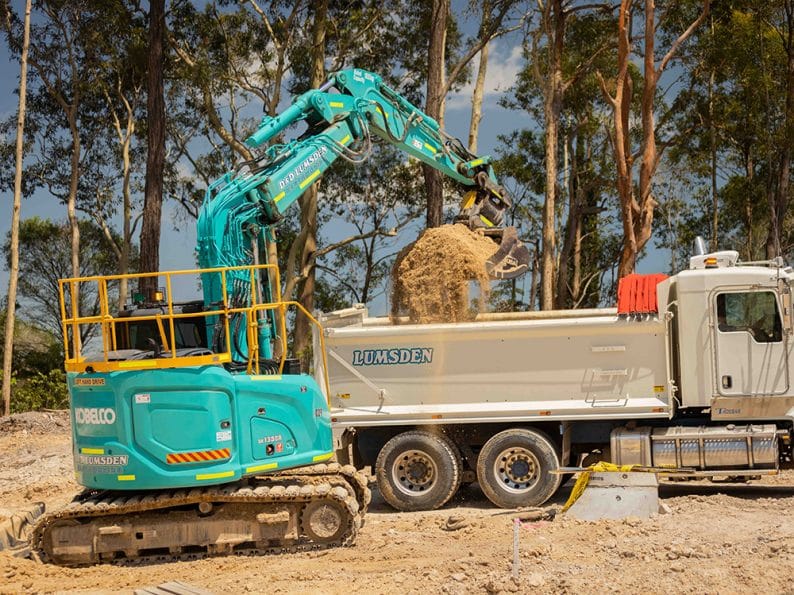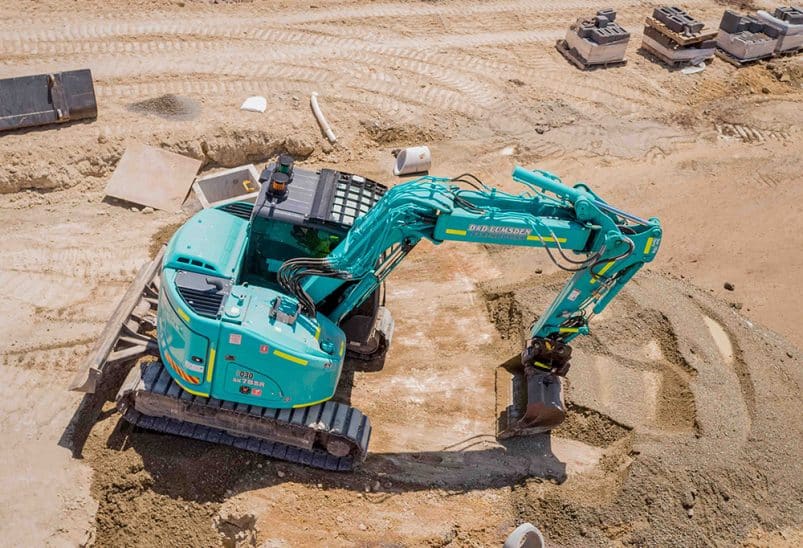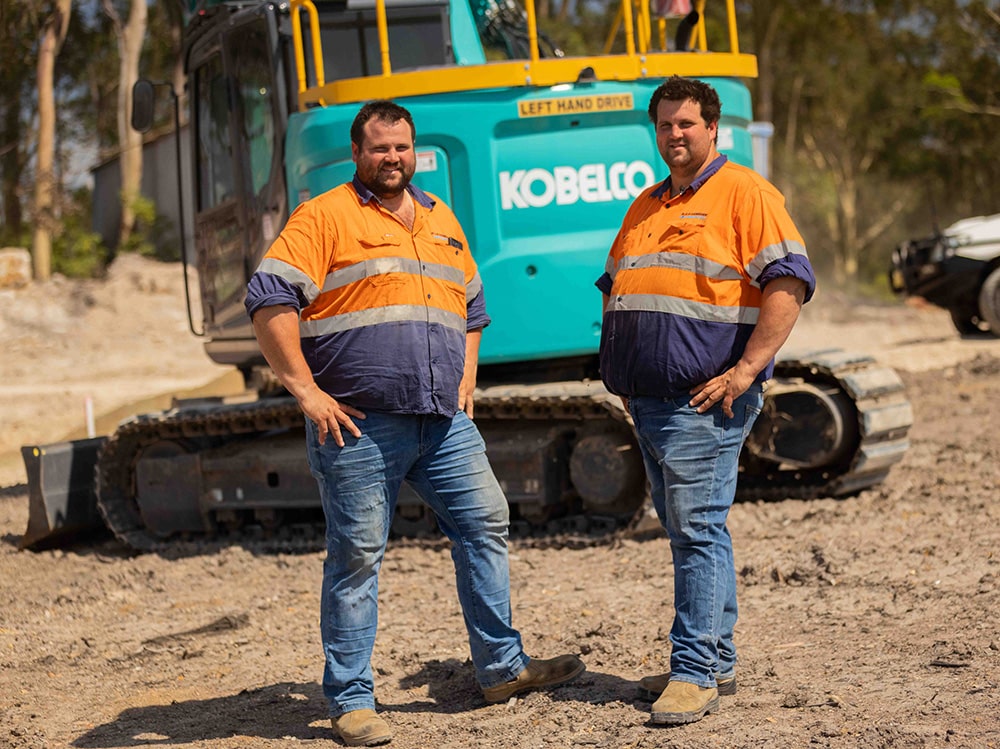D&D Lumsden Earthmoving
To The Power Of Two: D&D Lumsden Earthmoving
Even aside from being twins, Daniel and Drew Lumsden weren’t what you’d call typical teenagers. At an age when most kids get a weekend job stacking shelves at Woolies, they’d already started down a completely different path.
“We bought our first little digger – a three-and-a-half tonner – when we were about 16. Just out of school,” Daniel recalls. “Dad used to run us around to the jobs and pick us up in the truck because we didn’t have a truck license or anything.”
Growing up on a farm, just outside Morpeth, NSW, the boys were, of course, always around different machines. “My uncle’s got a dozer, so we were always intrigued with that sort of thing,” Daniel explains. “After a while, I ventured out and worked for a few different companies, while Drew continued working for himself. At some point, I’d had enough of working as an employee, so we went and bought our first 20-tonner. We would have been around 18, then.”
It’s a serious business kicking off with a brand new 20-tonner Hitachi, but Daniel says the decision was driven by the types of jobs they had coming in. “We’d lined up a bit of work prior to buying it,” he says. “After that first job or so, we started working for Daracon and Keller – primarily KCE. And from there we got into doing subdivisions.”
From that solid base of owning that first 20-tonner and a couple of smaller trucks, Daniel and Drew just kept working their way up. “We bought a 22-and-a-half ton Hitachi Dash-3,” Daniel says. “It had around 4,000 hours on it when we bought it. After that we tried a Volvo. We decided to start off with a couple of second-hand machines to get the feel and make sure it was all going to work out without buying new stuff.”
And work out it did. Soon the jobs were coming in steadily, along with the demand for more gear. “We just kept buying them as people were needing them,” Daniel says. “We bought a couple of Bobcats and Posi-Tracks and we had machines on hire for a fair while. And we still had more work coming, so we decided to go one step further and that’s when we started buying the Kobelcos.”
It was the team at Gato Sales and Repairs that helped the Lumsdens make that leap towards Kobelco. “We were after a 13-ton knuckle boom and Hitachi don’t bring them into the country anymore. So, we had to move to a different brand,” Daniel explains. “We went in and spoke to Tyson and the guys down at Gato. They took us through everything they’d be bringing to the table and it seemed like the way to go.”
Over the past five years since buying that first Kobelco machine, D&D Lumsden has enjoyed phenomenal growth. “There’s been a lot of development happening around this area,” Daniel explains. All the housing developments and estates going up. So, we had plenty of work going on.”
A lot of that success, Daniel says, has come down to establishing a good rapport with larger organisations. “We built a good relationship with KCE and Maitland Council,” he explains. “So, we had a fair few jobs with them. And also with Keller – they’ve got a lot of work around the area and a few of their supervisors like to work with us. So, we’ve just built up the demand, for people to want our machines for their jobs. And we can rely on that source of work to keep us all going.”
D&D Lumsden’s fleet has, of course, grown too, in line with demand. “We’ve got 16 excavators now,” Daniel says. “There’s only three Hitachis and the rest are all Kobelcos.”
That first knuckle boom certainly made a good impression, then? “Yeah, the knuckle boom is so versatile,” Daniel says. “You can do pretty much anything with them. They’re really good on subdivisions. And for the finishing off work and doing ag lines and all the odds and end jobs.”
More generally with the range, there are plenty of other benefits. “All the operators we’ve got working for us, they all give the Kobelcos the tick of approval,” Daniel says. “The room in the cab, and all the features they’ve got. Every time they bring a machine out, the Kobelco has gotten new features – with Bluetooth and all that sort of stuff in there. They’re really smooth, and there’s plenty of room in the cab, so the boys are happy. And we’re happy with how they present them as well.”
In terms of the technology, Daniel says it makes a big difference. “You’ve got to try and keep up with the times these days,” he says. “With all the features they come with – there’s that many different things they come with now – you can sit in there and you don’t even realize you’re sitting in an excavator for a day. They just keep improving and improving them.”
Daniel finds the 360-degree cameras particularly impressive. “Obviously, you can see right around,” he says. “And you can get a bird’s eye view and see right over the machine – where you are and what’s around you. Which is good on the safety side of things.”
Any conversation involving Kobelco always comes around to the fuel consumption at some stage and this one’s no exception. “We’d definitely rate it on fuel,” he says. “When you do your sums, every litre adds up. As the owner of the machines, it comes down to maintenance and fuel. That’s the bottom line.”
With all these benefits, it’s no wonder Daniel and Drew have kept buying them up. In fact, they’ve just recently bought 5 new machines. “Those were the SK135SR Dash-7s,” Daniel says. “That’s the 13-tonner. And I’ve got an SK17SR Dash-6 – the 1.7 tonner we bought as part of the promo deal.
Beyond the Kobelco fleet, D&D Lumsden also boasts some other top gear. “We’ve got three Bobcat Posi-Tracks,” Daniel says. “Two brand new ones and an older one. They’re always on the go, always going somewhere. So, they help with getting the work as well. And if you can do one thing, you can do the other, so the customers tend to stick with you.”
Daniel says he prefers the tracked skid-steer over the wheeled. “It’s just the performance and the work you can do with them,” he says. “With a wheeled Bobcat, you’re fairly limited if it’s a bit wet or anything like that. With the tracked machine, they’ll run across pretty much anything, within reason, to get the job done.”
His preference for Bobcat also goes beyond functionality. “It’s also the way they’re finished off and how they present the machine,” Daniel shares. “Everything’s neat and tidy. And the operators are all happy with them. So that’s all we’ve ever had, is Bobcat skid-steers.”
With such a wide range of gear, there can’t be too many jobs the business couldn’t tackle. “No, we can tackle pretty much anything that’s put on the table at the moment, which is good.” Daniel says.
It also means maintaining a wide range of attachments. “We’ve got hammers and augers. Compaction wheels and hydraulic grabs. Basically, anything you need. And if we haven’t got it, we can get it,” Daniel says. “The Bobcats all have tilt buckets, Norm Engineering brooms and spreader bars with them. So, any sort of attachment you’d need to get the job done.”
The Norm 6-way tilt-buckets are a particular favourite with Daniel. “I wouldn’t buy a machine without it now,” he says. “You can get yourself off to a pretty good start in a machine with a tilt bucket on it. Things like doing contour banks and drains. You don’t have to try and build your track up – you can just tilt your bucket and away you go.”
When it comes to purchasing all the gear, Daniel and Drew have split it down the middle. “We both do the purchasing. He deals with the Bobcats and I deal with the excavators,” Daniel explains. “So, for me, I deal a fair bit with Marty, our sales rep, down at Gato. He’s really good. You just ring him up and get a quote and it’s done in a couple of hours, usually.”
Daniel says it’s that service and backup that made the decision to purchase from Gato a no-brainer. “Downtime’s the biggest killer with what we do,” he says. “We really needed that backup and support and Gato is second to none on that front. Their knowledge of the mechanics is pretty good, too. If they can try to fix it over the phone, they will. If they can’t, they usually come straight out and away they go.”
In terms of maintenance, D&D Lumsden keep that all in-house. “We’ve got a mechanic that works for us – Harry – and he’s a big part of what we do,” Daniel shares. “He does all our mechanical and maintenance work, so we rely on him pretty heavily to make sure everything keeps going. He’s been with us for a couple of years now and has never let us down.”
A large fleet, of course, needs a big team of operators to drive them.
“We’ve got around sixteen excavators, nine trucks, three water carts, a dozer and a grader,” Daniel says. “So, we have around 20 operators now. As we grew, we were just trying to keep up with all the calls for the work. That’s how it happens, I suppose.”
Having 20 operators out there on various sites means the business is moving its fair share of dirt. “We’ve got a couple of jobs on the go right now,” Daniel shares. “A big job at KCE at Wallsend and we’ve got three or four machines with the Maitland Council. There’s a couple out with Daracon, too.”
While the business is set up to handle a wide range of projects, they’ve found themselves niching down. “We’ve done everything including railway work, subdivisions and roadworks. These days we specialise in subdivision work. But whatever comes at us, we’ll generally have a go.”
Getting the work has primarily come down to building a reputation for excellence. “Most of the work comes in through word of mouth,” Daniel says. “We’ve got highly skilled operators and they always do a good job. And when the customers are happy, they keep coming back. It’s all about maintaining that reputation. Because you can do a hundred good things and as soon as you do one thing bad, the whole world knows.”
A fleet of well-maintained, top-of-the-tree gear doesn’t hurt either. “Every time we get the opportunity for a machine to come back to the yard, we bring them in for a full detail,” Daniel says. “It makes a difference when the machines look good when they roll up. And the Kobelcos are a smart looking machine. They’ve done well in that category with how they present them. They’re easy on the eye.”
So, what does the future hold for a business that’s enjoyed explosive growth in such a short time?
“In terms of gear, we’re going to buy a 30-ton machine around early to mid-next year,” Daniels says. “That’ll be a bulk to get into the bigger jobs, moving the big mounds of dirt and boxing the roads out and getting everything going for the smaller machines to come in. We haven’t had a 30 tonner before, so we’re going to expand and buy five of them and then see where next year leads. After that, it’s anybody’s guess.”
So, what advice would Daniel give someone thinking about getting into the industry?
“I wouldn’t buy brand new straight away,” he shares. “You’ve always gotta crawl before you walk. A lot of people can’t afford a brand-new machine off the bat, anyway. So, it’s better to buy a secondhand one and work with what you’ve got, see who you end up doing work for and what you’re good at doing.”
That early fascination with the industry that first got the brothers into the business hasn’t really faded, just evolved more into the business side of things. “What I love about it is there’s always something to do,” Daniel laughs. “It does take a lot of our time – we might get a couple of hours on a Sunday afternoon, if we’re lucky. And I spend that with my son and the missus, have a bit of family time. But, other than that, we’re out here keeping all the wheels turning.”
Of course, being brothers – and twins, no less – they’ve had to learn how to work best together. “We don’t do too much work on the same site. Which is a good thing because we get in the shed here and we argue. It just doesn’t work,” Daniel laughs. “But we always have a beer at the end of the day. Work’s work and family life’s outside of work.”
On balance, Daniel says the main benefit of working as a team is they each have a reliable sounding board. “Honestly, we’re both pretty calm and collected,” he says. “It does mean we talk shop a lot. If we’re not at work driving an excavator, we’re talking about them. But when there’s a decision to be made, because there’s two of us, we can reassure each other. ‘Yeah, that’s the right way’ or ‘Yep, do that’. You can back each other.”
Written by: Australian Earthmoving Magazine


